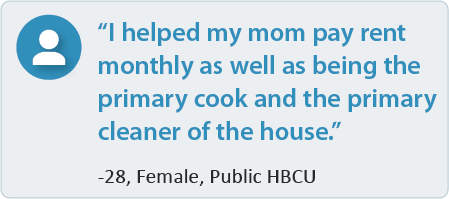The $1.7 trillion student debt crisis impacts over 44 million families nationwide, and the burden of student loans falls particularly heavily on Black students because of historical and ongoing systemic racism. While Black families themselves typically have less wealth to draw upon to pay for college due to the racial wealth gap, Historically Black Colleges and Universities (HBCUs) have also been underfunded throughout their histories, compounding the challenges for HBCU students who face financial challenges at both the familial and institutional levels. These challenges often result in higher student debt burdens for students who attend HBCUs and relative difficulty in repayment for graduates.
This memo presents five key takeaways from a survey of 1,900 individuals that was conducted online between April 10 and April 28, 2021 by the African American Research Collaborative on behalf of the United Negro College Fund, the Center for Responsible Lending, and the Center for Community Capital at the University of North Carolina at Chapel Hill. The survey compares the experiences of current and former Black students at HBCUs with their Black peers at predominantly white institutions (PWIs) as well as with their white peers.
Key takeaways include:
- HBCUs stepped up to support their students during COVID-19, with almost one in three (31%) Black student borrowers attending HBCUs reporting that they received emergency aid from their institutions compared to only one in five (21%) Black student borrowers at PWIs.
- Black borrowers both receive and provide financial assistance from their families, with almost one in three (30%) Black borrowers at HBCUs reporting that they provided financial support to their families while they were in college.
- Black women receive less financial support from family during college compared to Black men, and they tend to struggle more than their male counterparts during repayment.
- Many current student borrowers report skipping meals because there wasn’t enough money for food. Among current students at PWIs, fewer than one in three (29%) current Black students reported occasionally skipping meals, compared to more than two in five (44%) current Black student borrowers at HBCUs.
- Black respondents indicate overwhelming support for $50,000 in across-the-board student loan cancellation (85% support) and over nine in ten Black borrowers also support eliminating interest payments for all student loans, increasing state funding for HBCUs to match funding at public PWIs, and increasing the amount of the Pell Grant.
About This Project
This memo is part of a mixed-methods project that compares the financial experiences of Black student loan borrowers at Historically Black Colleges and Universities (HBCUs) with their Black peers at predominately white institutions (PWIs) as well as with their white peers. The project includes several memos including survey toplines, policy recommendations, focus group takeaways, and a memo on the HBCU student experience. This project was a collaboration between the Center for Responsible Lending, and the Center for Community Capital at the University of North Carolina at Chapel Hill, and the United Negro College Fund with support from the African American Research Collaborative and Hart Research. Generous funding from the Lumina Foundation made this research possible, and you can learn more at MyYardMyDebt.Org.
